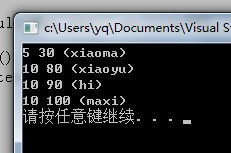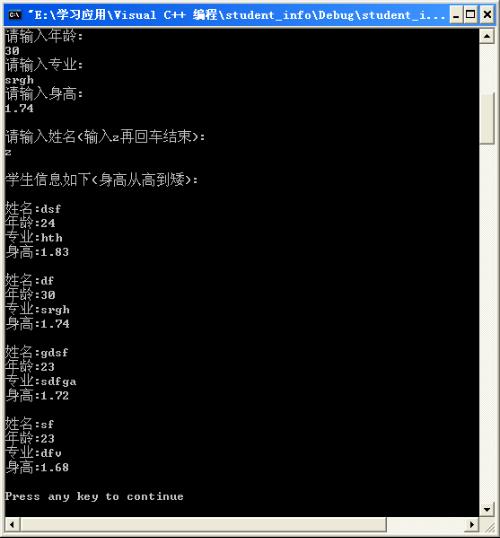c++学习——容器搜索方法(lower_bound, uper_bound)
本文主要是验证,容器搜索算法的使用:lower_bound, uper_bound
验证项目:
1. 当 key > begin 时 lower_bound, uper_bound 取值
2. 当 key < end 时 lower_bound, uper_boudn 取值
3. 当 key = 容器中的某值(不等于bigin,也不等于end) 时 lower_bound, uper_boudn 取值
4. 当 key 在 不等于容器中任何一Key, 但是在key 的返回 ower_bound, uper_boudn 取值
5. 当 key 等于 bigin, 当 key 等于 end 时 的取值
测试代码:
[cpp]
#include "stdafx.h"
#include <map>
#include <iostream>
using namespace std;
int _tmain(int argc, _TCHAR* argv[])
{
//lower_bound函数用法,这个函数用来返回要查找关键字的下界
//upper_bound函数用法,这个函数用来返回要查找关键字的上界
map<int,string>mp;
mp[3]="3";
mp[4]="4";
mp[7]="7";
mp[8]="8";
map<int,string>::iterator iterLowerBound5,iterUperBound5;
map<int,string>::iterator iterLowerBound7,iterUperBound7;
map<int,string>::iterator iterLowerBound3,iterUperBound3;
map<int,string>::iterator iterLowerBound8,iterUperBound8;
map<int,string>::iterator iterLowerBound10,iterUperBound10;
map<int,string>::iterator iterLowerBound1,iterUperBound1;
iterLowerBound5 = mp.lower_bound(5);
iterUperBound5 = mp.upper_bound(5);
iterLowerBound7 = mp.lower_bound(7);
iterUperBound7 = mp.upper_bound(7);
iterLowerBound3 = mp.lower_bound(0);
iterUperBound3 = mp.upper_bound(0);
iterLowerBound8 = mp.lower_bound(8);
iterUperBound8 = mp.upper_bound(8);
iterLowerBound10 = mp.lower_bound(10);
iterUperBound10 = mp.upper_bound(10);
if(iterLowerBound10 == mp.end())
cout << "iterUperBound10 = end" << endl;
if(iterUperBound10 == mp.end())
cout << "iterUperBound10 = end" << endl;
iterLowerBound1 = mp.lower_bound(1);
iterUperBound1 = mp.upper_bound(1);
if(iterLowerBound1 == mp.end())
cout << "iterUperBound1 = end" << endl;
if(iterUperBound1 == mp.end())
cout << "iterUperBound1 = end" << endl;
if(iterLowerBound1 == mp.begin())
cout << "iterUperBound1 = begin" << endl;
if(iterUperBound1 == mp.begin())
cout << "iterUperBound1 = begin" << endl;
//iter2 = mp.upper_bound(5);
string Str = iterLowerBound5->second;
cout<<"lower_bound(5) = " <<Str.c_str()<<endl;
Str = iterUperBound5->second;
cout<<"upper_bound(5) = " <<Str.c_str()<<endl;
Str = iterLowerBound7->second;
cout<<"lower_bound(7) = " << Str.c_str()<<endl;
Str = iterUperBound7->second;
cout<<"upper_bound(7) = " << Str.c_str()<<endl;
Str = iterLowerBound3->second;
cout<<"lower_bound(0) = " << Str.c_str()<<endl;
Str = iterUperBound3->second;
cout<<"upper_bound(0) = " << Str.c_str()<<endl;
Str = iterLowerBound8->second;
cout<<"lower_bound(8) = " << Str.c_str()<<endl;
//Str = iterUperBound8->second;
if(iterUperBound8 == mp.end())
cout<<"upper_bound(8) == end" << Str.c_str()<<endl;
while(1);
return 0;
}
打印输出:
iterLowerBound10 = end
iterUperBound10 = end
iterLowerBound1 = begin
iterUperBound1 = begin
lower_bound(5) = 7
lower_bound(5) = 7
lower_bound(7) = 7
lower_bound(7) = 8
lower_bound(0) = 3
lower_bound(0) = 3
lower_bound(8) = 8
lower_bound(8) = end8
结论:
当参数 key 没有在 容器 key的范围内:
1. 小于容器key uper_bound, lower_bound 都将返回 begin.
2. 大于容器key uper_bound, lower_bound 都将返回 end
当参数key 在容器key 范围内:
1. 参数 key == 容器key. lower_bound 将返回当前key 的iterator, uper_bound 将返回下一个元素的iterator.
2. 参数 key 不等于 容器key,且在范围内, loer_bound将返回 比参数key 大的且相邻的容器key的iterator
3 如果 Key等于 begin 或等于 end,将返回begin 或end
摘自 DriverMonkey的专栏
补充:软件开发 , C++ ,




